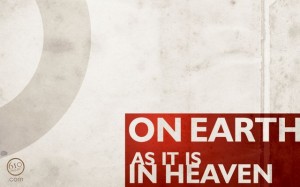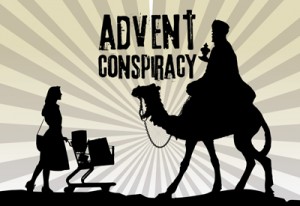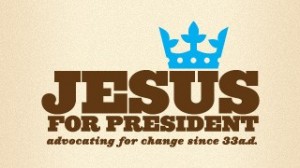 Below you'll find the second message in our series on the Lord's Prayer. The message was focusing on "Thy Kingdom Come, thy will be done, on earth as it is in heaven." And below the message is the questions that we discussed following the message. Would love to hear your thoughts, comments, etc....
Below you'll find the second message in our series on the Lord's Prayer. The message was focusing on "Thy Kingdom Come, thy will be done, on earth as it is in heaven." And below the message is the questions that we discussed following the message. Would love to hear your thoughts, comments, etc....
This morning we continue our series that we started last week looking at the Lord’s Prayer, or as one author that I have been reading called it, the Disciple’s Prayer. Over 6 weeks we will be breaking down the Lord’s Prayer into six sections and themes, that I believe are crucial for a disciple of Jesus to understand, live out, and apply to their missional context. Or to put it in another way, to genuinely pray this prayer and live a live according to its truth is to walk in the way of Christ.
Last week we took time to focus on the very first part of the prayer, “Our Father in heaven, hallowed be your name.” and we talked about prayer needing to start with God the Father. But we also spent a lot of time talking about some of our struggles calling God by Father or even Dad. But in the end we talked and discussed most about the love of our Father in that he adopted us as sons and daughters. And how this should change the way we interact with not only Him but with all people, whether they are followers of Jesus or not, because in a way we are all children of God.
Today we are going to cover probably my most favorite part of the Lord’s Prayer, the second part. And in covering this part, we will be taking time to dialogue and discuss these provocative questions, “What would it be like if Heaven touched down on Planet Earth? What would happen? What would be different? And how are we called to live out that reality right now.”
So let’s turn to Matthew 6:9-13 where we find one version of the Lord’s Prayer. Mathew 6:9-13 are the words of Christ himself and he says this, “This, then, is how you should pray: “‘Our Father in heaven, hallowed be your name, your kingdom come, your will be done, on earth as it is in heaven. Give us today our daily bread. And forgive us our debts, as we also have forgiven our debtors. And lead us not into temptation, but deliver us from the evil one.’
So we today we are focusing and unpacking this part of the prayer, “Your Kingdom come, your will be done, on earth as it is in heaven.” We probably could have chosen to do this one in two parts talking about what the Kingdom of God is, and his will and also what it looks like when heaven comes to earth. But I truly believe that the Kingdom of God is what happens when heaven touches down on earth. And believe it or not, that question, “What does it look like when heaven touches down on earth?” has actually been answered for us, and the answer is in the person and work of Jesus, and by definition what we are then called to do and be about. This declaration that Jesus is making for his Kingdom is one that is affirming a distinct future hope. It is a declaration that God will, in human history, fulfill his covenant promises and establish his kingdom in fullness. Jesus is promising that the blessed kingdom of Shalom (Peace) is breaking through, if only in part, into the world here and now. So let’s take some time exploring the idea of the Kingdom of God and what our role in the Kingdom is. And the best place I believe to find out our role is to look at what people have called Jesus Manifesto or his mission statement for his ministry on earth. Let’s turn together to Luke 4:16-21 and see what it might say to us in relation to bringing heaven to earth and living out his will and his Kingdom.
“He went to Nazareth, where he had been brought up, and on the Sabbath day he went into the synagogue, as was his custom. He stood up to read, and the scroll of the prophet Isaiah was handed to him. Unrolling it, he found the place where it is written: “The Spirit of the Lord is on me, because he has anointed me to proclaim good news to the poor. He has sent me to proclaim freedom for the prisoners and recovery of sight for the blind, to set the oppressed free, to proclaim the year of the Lord’s favor.” Then he rolled up the scroll, gave it back to the attendant and sat down. The eyes of everyone in the synagogue were fastened on him. He began by saying to them, “Today this scripture is fulfilled in your hearing.”
So as I mentioned before this is kind of like Jesus mission statement for his ministry. And I believe by definition, if we are followers of Jesus, then in some way this should also be what we are all about as well. This is what I believe it looks like when heaven touches down on earth. This is how Jesus lived his life, and this is how we are to also live out the Kingdom of God here and now. As Luke 17:20-21 says, “Once, on being asked by the Pharisees when the kingdom of God would come, Jesus replied, “The coming of the kingdom of God is not something that can be observed, nor will people say, ‘Here it is,’ or ‘There it is,’ because the kingdom of God is in your midst.” The Kingdom of God is in our midst when we live out what we are called to do, which is live in such a way that the DNA of Jesus is lived, breathed, and spread into the world. But what is the DNA of the Kingdom or what is the mission of Jesus? He spells it out in verses 18-19. His mission was to and is to heal the fivefold damage that sin has brought. He did this in such a way that it wasn’t just spiritual healing but physical as well, and we are called to the same thing, to heal spiritually and physically.
So Jesus was about preaching the gospel to the poor. Sin impoverishes and the Messiah will bring good news to the poor. Jesus had and has a soft place in his heart for the poor. After all just a few verses earlier in the Sermon on the Mount Jesus says, “Blessed are the poor in Spirit for theirs is the Kingdom of Heaven.” So if Jesus was about bringing good news to the poor, one way that heaven comes to earth, is when followers of Jesus bring good news to the poor. Now this doesn’t just mean preaching to the poor about Jesus (though this includes that) but means figuring out what good news is for the poor and then when you find it out, acting upon that. Good news changes when you take time to listen first and you’ll then know what next steps to be undertaken. If we are truly the followers of Jesus, then the poor in our world should hold a special placed in our hearts and we should work to bring good news to them (that means taking care of their physical, emotional, relational, spiritual, and even economic needs). Jesus mission was also to heal the brokenhearted. Sin breaks hearts and the Messiah has good news for the brokenhearted. Think about the stories of loss and pain because of disease, sickness, and death that Jesus came upon in his ministry. Think about his ministry to these individuals, their families and ultimately their communities brought good news to the brokenhearted. If we are to see heaven come to earth, we need to work to heal the brokenhearted. Whether that means through praying for them, spending time just being with him (like how the 3 friends of Job did when they spent the first 7 days with him without saying a word), or listening to them to discern what would heal their broken heart (if anything…because we all know there are things that no matter what, only Jesus and Heaven can heal).
Next in the mission of Jesus is to proclaim liberty for the captives. Sin makes people captive and enslaves them and the Messiah has come to set them free. Jesus set us free from the chains of death, sin, evil, and Satan but all too often we all too often then choose to put the chains back on ourselves. His life, death, and resurrection has freed us from those things and we don’t need to go running back to them and be enslaved to them anymore. And as a part of bringing heaven to earth, followers of Jesus need to proclaim liberty for the captives. I believe that means both spiritually and physically. We need to proclaim the freedom that comes from giving your life to Jesus, but we also have to be on the forefront of working to end the issues of Human Trafficking, and Slavery, because believe it or not there are more slaves now in our world than ever before. There are between 14,500-17,000 humans trafficked in the US each year. And Human Trafficking is a 15.5 billion dollar industry. These numbers should not be and is an area which I feel strongly about, that followers of Jesus, who should work towards heaven coming to earth, should fight this, and there are many who are. I believe that this is one concrete thing that Veritas can be involved in and work specifically with. Jesus was also about bringing recovery of sight to the blind. Sin blinds and Jesus came to heal people from blindness. In this ministry, he healed people from both their physical and their spiritual blindness. Part of bringing heaven to earth includes working on bring sight to the blind. And just like Jesus this means spiritual blindness and physical blindness. Whether that means going to other countries with doctor’s and doing eye examinations, collecting eye glasses for people who need them, or sharing the gospel of Jesus and praying that the Holy Spirit will open the eyes of those you share with. And lastly Jesus worked at liberation of those who were oppressed. Sin oppresses its victims and He came to bring liberty to the oppressed. We also need to work for the liberation of the oppressed in our world. Oppression takes many forms including religious oppression (of all kind and not just Christian oppression), gender oppression (many women in our world are the victims of various forms of oppression- economic, domestic violence, spiritual, etc...), and ethnic oppression (based on ethnicity, etc...) Also we need to work for the liberation of the spiritually oppressed, those who need to experience the freedom that Christ came to give. The freedom from the oppression of the evil one. Only when oppression finally ceases will heaven fully come to earth. But we need to continue working for freedom for the oppressed, so that heaven begins to come to earth. So let’s talk more about what it looks like when heaven touches down on earth, what God is already doing, what he wants to do and how God might be calling Veritas to partner with him in the building of his Kingdom
1. Thoughts, comments, insights, questions, etc. regarding the message and the Scriptures? 2. What does it look like to you when Heaven touches down on earth? Tell a story when you have been a part of or seen heaven touching down on earth. 3. What is God already doing in our community/world? What does God want to do in our community/world? 4. How might God use Veritas and each of us in what he is already doing in the world and what he wants to do in the world? How can we help bring heaven to earth?











